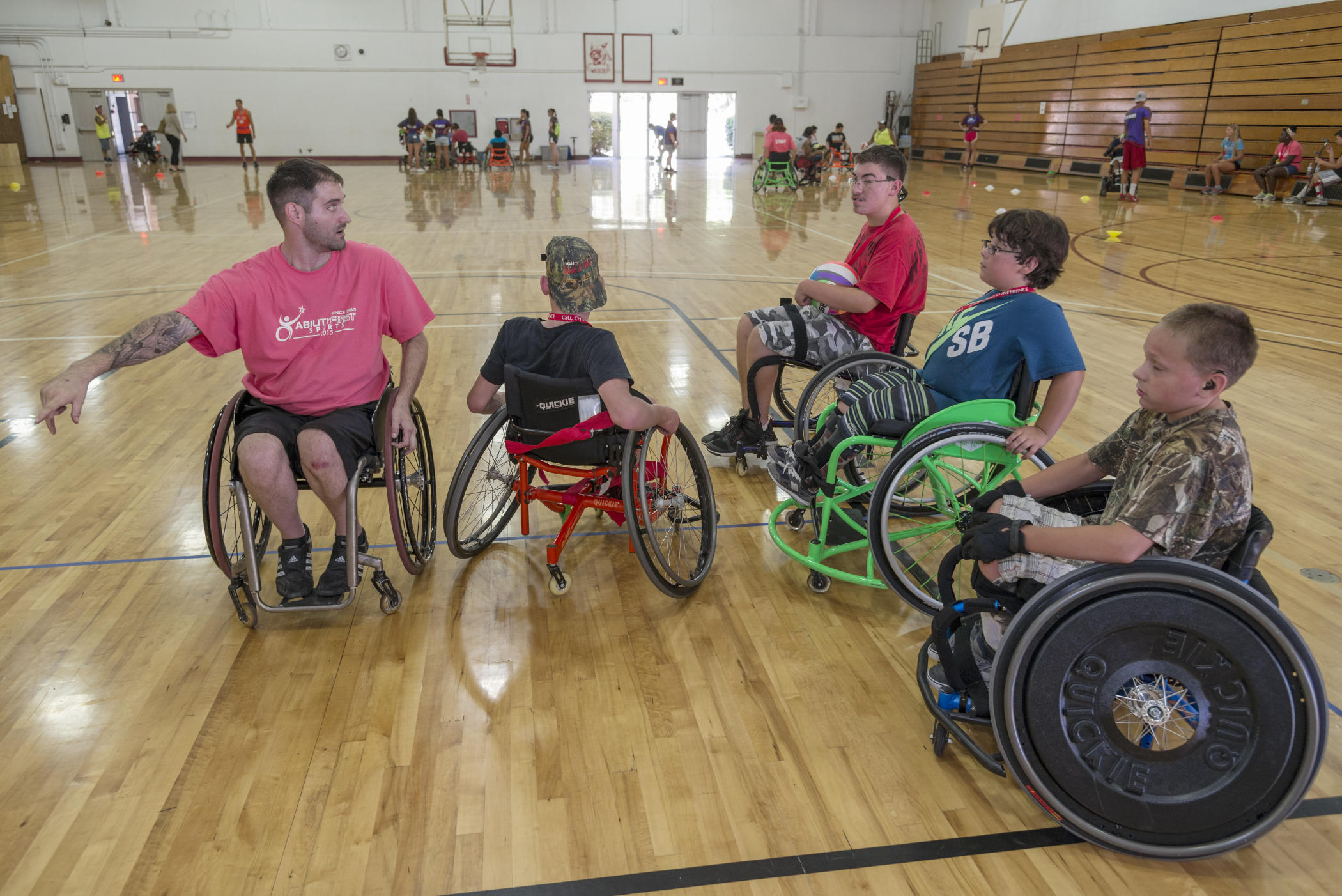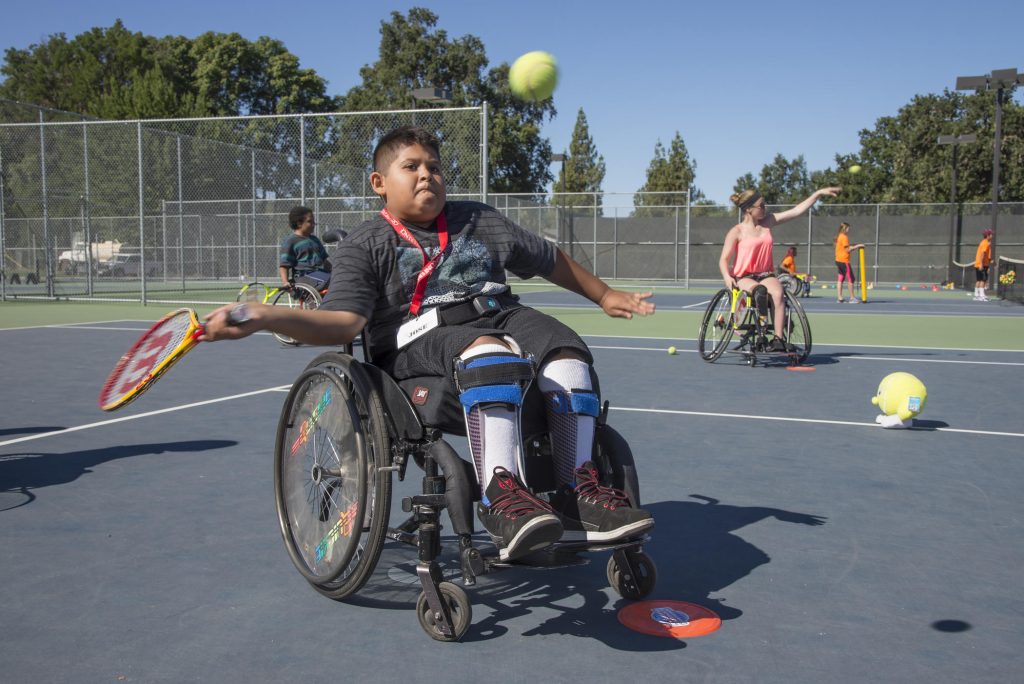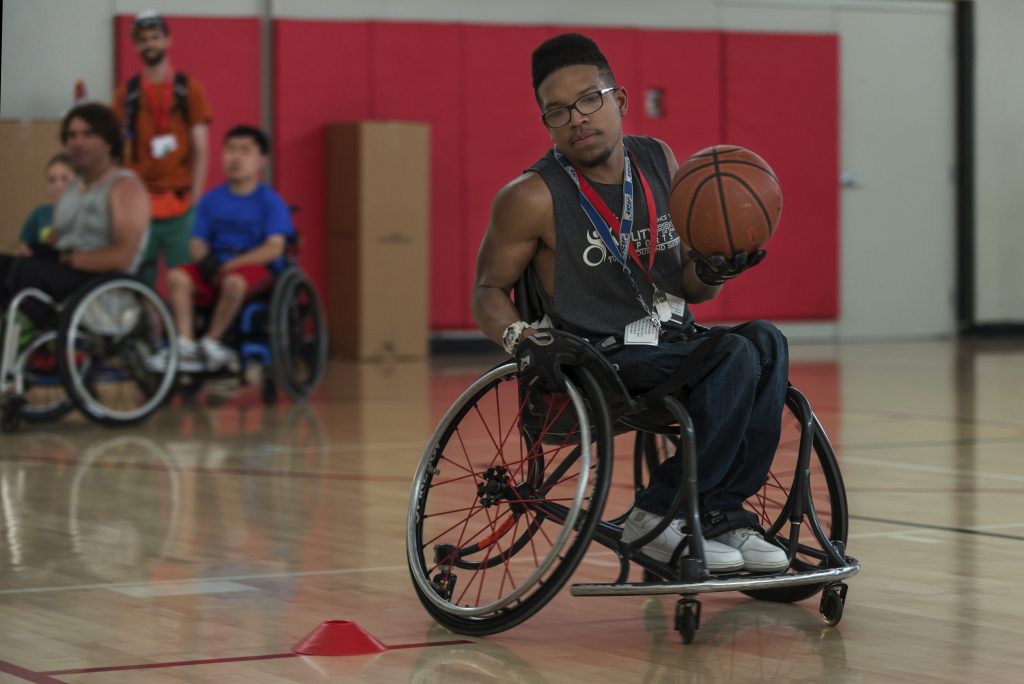Ability First Educates and Empowers Through Sports Instruction

Devon Saul instructs his students in basketball at the annual Ability First Sports Camp, a sports and recreation instructional summer camps for children ages 8 to 17 with physical disabilities. Chico State plays host to many of the camp events and faculty and its Department of Recreation, Hospitality, and Parks Management provides staffing support for the camp.
When she was 11 years old in 1989, North State native Kerri Vanderbom attended her first Ability First Sports summer camp in Chico, a sports and recreation instructional summer camps for children ages 8 to 17 with physical disabilities.
“Growing up in Gridley, there was one other guy in a wheelchair, and he was older,” said Vanderbom. “So as a camper, it was really the first time ever being around other people with disabilities.”
Seeing other children her age at the camp using wheelchairs was especially eye-opening.
“At first, it was like, ‘Oh my God, is that what I look like?’” she said. “But after a while, I realized that these are my people.”
Vanderbom became a coach at the camp in 1995 and returns to coach every summer.
Since its inception on 1987, Ability First Sports has developed into one of the country’s premier summer camps of its kind. And next week, campers, counselors, and coaches from around the country will congregate in Chico for the 33rd consecutive adapted sports summer camp.

(Jason Halley/University Photographer)
Beginning with Sunday’s mid-afternoon registration, the campers go nonstop through June 23 with morning, afternoon, and evening programs. They participate in basketball, tennis, adapted aquatics, archery, water skiing, and quad rugby, as well as a skit night and a camp-culminating dance at the end of the week.
Laura McLachlin was a new recreation therapy professor at Chico State in 1987 when colleague and kinesiology professor Eric Snedeker invited her to check out a new program he’d started a few years before. At the time, Ability First Sports was a camp held only at Chico State that focused on wheelchair sports instruction for children, run by the camp’s director, Snedeker, and the students from the University’s adapted physical education program.
McLachlin saw firsthand the joy the campers expressed as they played sports and rejoiced in a community where they fit right in. Laura was sold.
“I told him, ‘Eric, we can make this even bigger and better,’” she recalls.
Ability First Sports evolved from a one-day experience the first year to a highly anticipated weeklong sleepaway summer camp for youth with disabilities. As it begins its fourth year of year-round instruction for both youth and adults, it continues to transform lives.
“I hear some of the kids say, ‘This [camp] is where I feel like a kid,’” said Jennifer Taylor (Physical Education, ’01; MA, Kinesiology, ’06), a volunteer with Ability First since 2001. “Here, they’re not the kid in a wheelchair, not the kid with a disability who has trouble walking or has trouble talking.”
“Here, they’re just a kid,” said Taylor, “and that’s huge.”
Chico State continues to be the camp’s de facto home base, and Acker Gym and University Stadium have hosted multiple events for years, while events also take place at venues all around Chico. Current and former recreation therapy and adapted physical education students staff the counselor and volunteer rosters. And the Department of Recreation, Hospitality, and Parks Management is a key driver, providing faculty and fundraising support.
Campers—often for the first time in their lives—receive expert sports instruction. And as events were added to the adapted sports realm over the years, Ability First added them to its own repertoire, bringing in coaches with experience competing at an adapted sport at the collegiate, national, or international level.

(Tyler Wright / Student Photographer)
Vanderbom (Recreation Therapy, ’00; MA, Kinesiology, ’10), who was introduced to water skiing at an Ability First Sports camp, is a former world champion water skier and continues to compete on the US Disabled Water Ski Team. Her husband, Derek Vanderbom, is a World Disabled Water Ski gold medalist (seated division). Christiaan Bailey is a USA Surfing national champion (adaptive division). Devon Saul was a three-time national champion in quad rugby at the University of Texas-Austin and a two-time Paralympian. Anthony Lara represented the US as a member of its Paralympic tennis team in 2000. And Elissa Robinson is a two-time national collegiate wheelchair basketball champion at University of Alabama.
“Some of our coaches are the best in the world at what they do,” Snedeker said. “It’s like if LeBron James came to Chico to coach basketball.”
While the summer camp introduces campers to new sports, its significance runs much deeper. Its staff are advocates where the campers may never have had one outside their families.
The learning at camp surpasses sports instruction. The staff and coaches teach campers how to fuel an athletic body, what to eat in order to stay fit, and offer tips on personal hygiene—all steps intended to boost the campers’ athleticism, McLachlin said.
Most importantly, campers are welcomed, valued, and respected in this inclusive environment. The camp can be an empowering and transformative experience for them, and between greeting old friends like family, planting seeds for new friendships, and learning and honing important skills, campers come away brimming with confidence.
“I love seeing the new campers that have never been away from home, and to see them when they come out of their shell and learn what they can do on their own,” said Rochelle Brace (Recreation Therapy, ’10), an Ability First Sports counselor since 2008. “It opens their eyes to the possibilities.”


